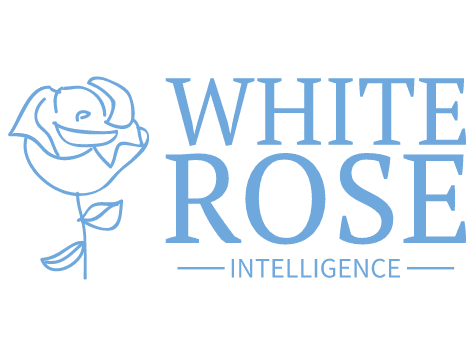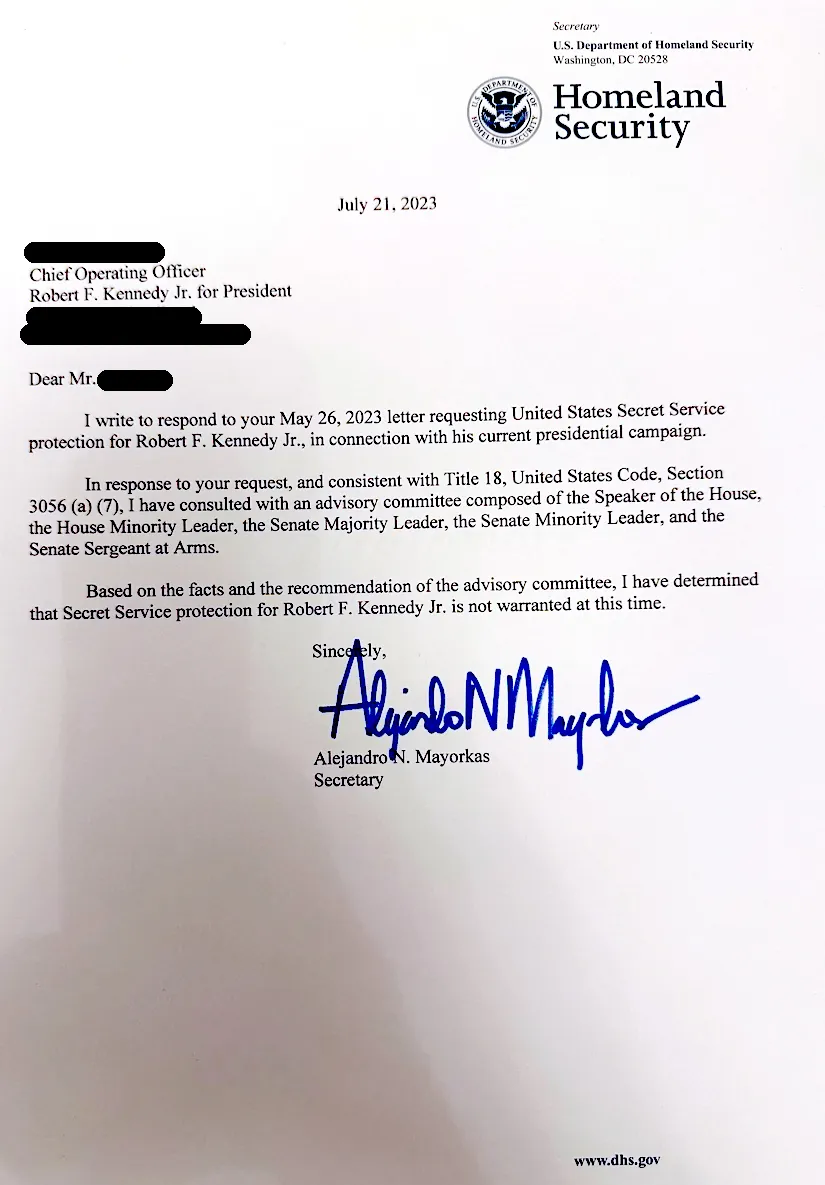Originally published by The Kennedy Beacon
Is the Biden Administration behind not granting Robert F. Kennedy, Jr. Secret Service protection? Why? And why had presidential candidate Barack Obama, for example, gotten it early and now not Kennedy?
Last week, Homeland Security Secretary, Alejandro Mayorkas, denied Kennedy’s request for U.S. Secret Service (USSS) protection, breaking protocol and casting a cynical shadow over the Biden Administration’s handling of the upcoming 2024 presidential election.
Kennedy strongly believes his request should have been approved, despite Secretary Mayorkas’ assertion that his agency’s support is “not warranted at this time.” To prove his case, he shared a series of internal memos outlining the process of requesting protection from the Secret Service, including day-by-day summaries of steps taken to fully comply with the agency’s requests.
“Apr 18: First discussions between my company [Gavin de Becker & Associates] and USSS (101 days before finally receiving a decision from DHS)
May 1: First substantive and detailed discussions with USSS about RFK Jr requesting protection. (This was 88 days before the response from Secretary Mayorkas was received, a number into which some people are apparently investing special meaning.)
On this date, I received a very cordial, constructive, and professional presentation from the Secret Service, from which it was determined that our next step was to complete our internal risk assessment, and then submit the pro forma letter.
USSS provided me with a detailed description of the various criteria that would be considered, all of which were already met by RFK Jr.” – Gavin de Becker
The authors of the memos are Gavin de Becker, Kennedy’s head of private security, and campaign manager Dennis Kucinich.
These memos strikingly reveal the Department of Homeland Security (DHS), not Kennedy, appearing to circumvent standard procedures. Moreover, they reveal the bizarre manner in which media outlets such as CNN have spun the narrative.
“Since seeing a few media reports on a truly bizarre projection of meaning into various numbers associated with this process, I’m adding some more numbers to the mix. Though any (or maybe many) of these dates and numbers might also be perceived as meaning something to somebody somewhere, this accurate account of the details associated with requesting Secret Service protection will explain where various numbers actually originated.
I note in all good humor that during my long career, I’ve never seen this kind of attention invested into the truly insignificant details of an important matter.” – Gavin de Becker
The significance of this denial can not be overstated, and has been discussed at length since Kennedy revealed the news on Friday. Among the commentators tackling the debate is Chief Nerd, whose summary on Twitter provides context for why Kennedy should be granted the protection of the Secret Service.
The irony was not lost on Kennedy. After his father and namesake was assassinated while campaigning for president in 1968, the federal government offered all presidential candidates Secret Service protection. Since then, “major” candidates have benefited from the same protection as the President, Vice President and their families.
As the son of the late presidential hopeful, and the nephew of the most recent president to be assassinated, RFK Jr. is arguably among the candidates most deserving of federal protection.
“USSS advised me that there is no set timeline for receiving protection, and cited candidate Barack Obama receiving protection very early in the process, 551 days before Election Day. RFK Jr’s uncle, Senator Ted Kennedy, received early Secret Service protection in 1972, when he wasn’t even an announced candidate. In 1979, the Carter Administration provided Secret Service protection for Ted Kennedy again — 400 days before Election Day. President Nixon and Ted Kennedy were longtime political enemies. Jimmy Carter was a sitting president being challenged by someone in his own party — yet these considerations did not stop either President Nixon or Carter from having the basic decency to realize that there could be all sorts of sociopaths and others looking to be the next Kennedy assassin.” – Gavin de Becker
But now that Kennedy has been denied such protection by the Secret Service, many media outlets are pushing back. They’re accusing Kennedy of misrepresenting the role and responsibilities of the Secret Service in protecting presidential candidates.
CNN, for example, opined in a “fact check” that Kennedy “baselessly suggested” that “the Biden administration is singling him out for rare treatment by denying him Secret Service protection.” This, despite CNN’s own Scott Jennings previously calling for “all those running for the White House” to be protected during the 2020 election, citing “Too damn many crazy people out there who have proven time and again they can get WAY too close to candidates.”
“Many weeks ago, RFK Jr met the criteria for a presidential candidate to receive Secret Service coverage, pursuant to Title 18 U.S.C.’ 3056(a)(7). He polled above the threshold, has been actively campaigning on a national basis, operates a national campaign apparatus, has appeared before thousands of audience members at events in many states, regularly appears as a candidate on national network news programs, town halls, podcasts, interviews, is producing campaign materials, advertisements, and websites, is successfully fundraising, and has assembled a large campaign staff.” – Dennis Kucinich
It remains to be seen if the Department of Homeland Security will approve any future request for protection that the Kennedy campaign may submit as the Democratic primaries draw nearer.
In the meantime, Kennedy and his supporters have continued publicly raising the issue in order to increase awareness and bolster his ever-increasing support from the general public and campaign backers alike.
The memos can be read in full on Robert F. Kennedy Jr.’s Substack, linked here.

